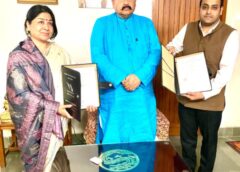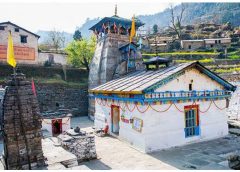Dehradun. The Uttarakhand Tourism Department inked an MoU (Memorandum of Understanding) with the Tourism and Hospitality Skill Council to open a new chapter towards responsible and sustainable tourism (THSC).
The MoU was signed by Shri Rajan Bahadur – Chief Executive Officer, THSC, and Smt. Poonam Chand – Additional Director, Uttarakhand Tourism in the presence of Hon’ble Tourism Minister Shri Satpal Maharaj.
Honorable Tourism Minister Shri Satpal Maharaj said, “Uttarakhand is known for its warm hospitality both domestically and internationally. This collaboration will start a new chapter in our hospitality by offering training to individuals working in the tourism sector. It will give visitors a sense of belonging and entice them to return to Uttarakhand repeatedly if taxi drivers, owners of guest houses and dhabas, and tourist guides here greet visitors from abroad in their language and offer guidance for the duration of their stay. Additionally, this partnership would enable tourists to get a closer view of Uttarakhand’s culture and natural beauty. This collaboration will encourage intercultural exchange while simultaneously promoting self-employment”.
Mr. Sachin Kurve, Secretary of Tourism, Government of Uttarakhand said, “We work to advance tourism in Uttarakhand to a new level across the nation. Our effort in that direction is represented by this MoU. The training program aims to increase accessibility to the upcoming Char Dham Yatra, develop the technical and practical skills of the residents already employed in the state’s tourism industry, and guarantee social development, self-employment, and entrepreneurial opportunities, in addition to bolstering the state’s economy.”
In accordance with this MoU, the state of Uttarakhand’s reputation as a top tourist destination has to be elevated by extending a warm welcome to visitors arriving for religious or other types of tourism and creating a sense of community for them by greeting them in their language. As part of the training effort, 4000 persons, including taxi drivers on the Chardham or religious route, dhaba and guest house operators, heritage tour guides, and wildlife guides, will receive training to upskill and reskill. Aside from the trainees’ main goal of educating tourists about responsible tourism, the training programme will concentrate on topics like digital and financial literacy, health, hygiene, safety, and the creation of self-employment. The training course will be offered in each of the state’s 13 districts.



